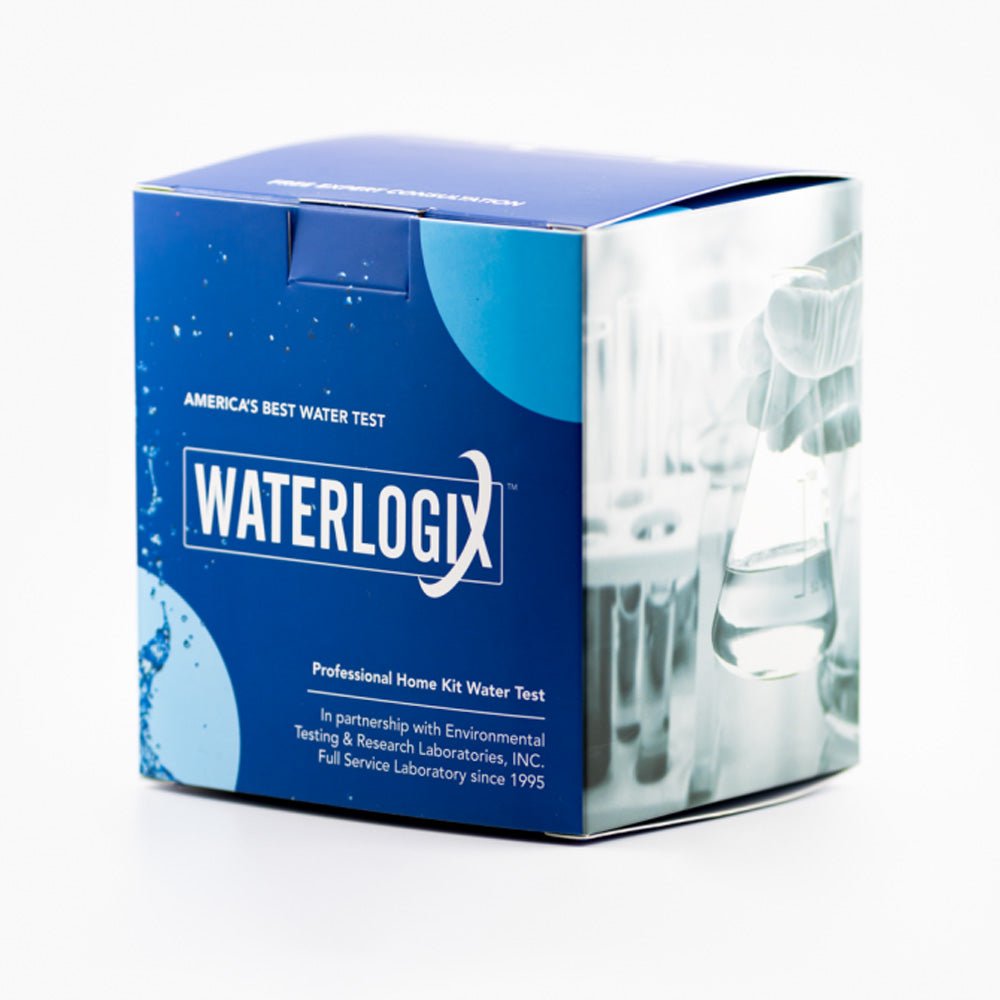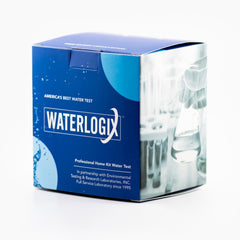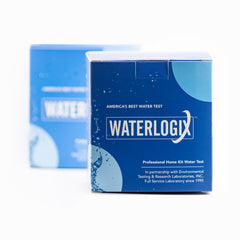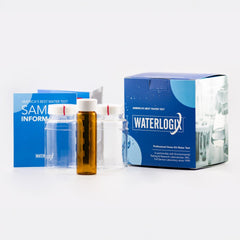SIGN UP FOR OUR NEWSLETTER
Receive our latest updates about our products & promotions.




The WaterLogix Premium Water Test provides a comprehensive laboratory water analysis, designed to check for a wide spectrum of chemical contaminants. These contaminants span both natural and chemical varieties, including numerous carcinogenic contaminants. Altogether, this premium water analysis checks for 113 contaminants.
Order by 12 PM EST and this system will be on its way the very next day.
Free standard shipping on most products over $199.
Free shipping on most products over $199. Freight orders excluded. Speak to a water expert for more details.
Our Master Water Specialists and Certified Water Specialists review your water analysis and address your specific water problems. WE then design a system that we'll guarantee will solve your water problem(s) and back it with our One-Year Money Back Promise (Guarantee).
It all starts with a Laboratory Test of your water. Then, our Master Water Specialists and Certified Water Specialists will review the results of your water analysis and scientifically discuss the best way to treat your water, provide on estimate of how to do that, and then we provide you a One-Year Guarantee of Satisfaction. It's our Promise to You that our system will do what we say or we will give you your money back*

If your water source is a private well, we highly recommend a detailed laboratory water analysis. This crucial information allows our water experts to recommend a water treatment system tailored to your unique water chemistry, giving you the invaluable gift of peace of mind.
Countless people choose US Water Systems because they understand the importance of high-quality, American-made water treatment systems. Our Premium Test is designed to evaluate the same 53 common contaminants that our Basic Test analyzes, plus 59 additional contamination you may find in well water.
Unsure if this water quality test is the right fit for you? Call one of our Certified Water Specialists at 1.800.608.8792, and we can help you identify the most suitable test for your needs.
Improve your home's water with our expert test! Purchase our water analysis, and if you choose our recommended Whole House Point of Entry System, enjoy a $179 rebate on your system. Plus, we offer free shipping for the water test, both to you and to the lab for utmost convenience. Note: Point of Use systems are excluded from this rebate. Free Shipping in Continental U.S. Only.

Here's the process:
Here's a comparison of the contaminants analyzed in America's Best Water Tests vs other companies offerings:
| America's Best Water Test - Premium |
America's Best Water Test - Basic |
Other Companies Water Test |
|---|---|---|
| Total Coliform | Total Coliform | pH |
| Fecal E. coli | Fecal E. coli | Total Dissolved Solids |
| Total Bacteria Count | Total Bacteria Count | Hardness |
| Aluminum | Aluminum | Iron |
| Antimony | Antimony | Iron Bacteria |
| Arsenic | Arsenic | Manganese |
| Barium | Barium | Copper |
| Beryllium | Beryllium | Nitrates |
| Boron | Boron | Tannins |
| Cadmium | Cadmium | |
| Calcium | Calcium | |
| Cerium | Cerium | |
| Chromium (Total) | Chromium (Total) | |
| Cobalt | Cobalt | |
| Copper | Copper | |
| Iron | Iron | |
| Lead | Lead | |
| Lithium | Lithium | |
| Magnesium | Magnesium | |
| Manganese | Manganese | |
| Mercury | Mercury | |
| Molybdenum | Molybdenum | |
| Nickel | Nickel | |
| Phosphorous | Phosphorous | |
| Potassium | Potassium | |
| Selenium | Selenium | |
| Silver | Silver | |
| Sodium | Sodium | |
| Strontium | Strontium | |
| Thallium | Thallium | |
| Tin | Tin | |
| Titanium | Titanium | |
| Uranium | Uranium | |
| Vanadium | Vanadium | |
| Zinc | Zinc | |
| Chloride | Chloride | |
| Fluoride | Fluoride | |
| Nitrates (as N) | Nitrates (as N) | |
| Nitrite | Nitrite | |
| Sulfate | Sulfate | |
| Alkalinity (as CaCO3) | Alkalinity (as CaCO3) | |
| Ammonia | Ammonia | |
| Color | Color | |
| Conductivity | Conductivity | |
| Hardness | Hardness | |
| Odor | Odor | |
| pH | pH | pH |
| Sediment | Sediment | |
| Silica | Silica | |
| Tannins | Tannins | |
| Total Dissolved Solids | Total Dissolved Solids | |
| Turbidity | Turbidity | |
| Radon | Radon | |
| Benzene | ||
| Bromobenzene | ||
| Bromochloromethane | ||
| Bromodichloromethane | ||
| Bromoform | ||
| Bromomethane | ||
| n-Butylbenzene | ||
| sec-Butylbenzene | ||
| tert-Butylbenzene | ||
| Carbon-Tetrachloride | ||
| Dibromochloromethane | ||
| Chloroethane | ||
| Chloroform | ||
| Chloromethane | ||
| 1,2-Chlorotoluene | ||
| 1,4-Chlorotoluene | ||
| 1,2-Dibromo-3-chloropropane | ||
| Dibromomethane | ||
| 1,2-Dibromoethane | ||
| 1,3-Dichlorobenzene | ||
| 1,2-Dichlorobenzene | ||
| 1,4-Dichlorobenzene | ||
| Dichlorodifluoromethane | ||
| 1,1-Dichloroethane | ||
| 1,2-Dichloroethane | ||
| 1,1-Dichloroethylene | ||
| cis-1,2-Dichloroethene | ||
| trans-1,2-Dichloroethene | ||
| 1,2-Dichloropropane | ||
| 1,3-Dichloropropane | ||
| 2,2-Dichloropropane | ||
| 1,1-Dichloropropene | ||
| 1,3-Dichloropropene | ||
| trans-1,3-Dichloropropene | ||
| Ethylbenzene | ||
| Trichlorofluoromethane | ||
| Hexachlorobutadiene | ||
| Isopropyl benzene | ||
| p-Isopropyltoluene | ||
| Methyl-t-Butyl Ether (MTBE) | ||
| Methylene Chloride | ||
| Monochlorobenzene | ||
| Naphthalene | ||
| n-Propylbenzene | ||
| Styrene | ||
| 1,1,1,2-Tetrachloroethane | ||
| 1,1,2,2-Tetrachloroethane | ||
| Tetrachloroethylene | ||
| Toluene | ||
| 1,2,3-Trichlorobenzene | ||
| 1,2,4-Trichlorobenzene | ||
| 1,1,1-Trichloroethane | ||
| 1,1,2-Trichloroethane | ||
| Trichloroethylene | ||
| 1,2,3-Trichloropropane | ||
| 1,2,4-Trimethylbenzene | ||
| 1,3,5-Trimethylbenzene | ||
| Vinyl Chloride | ||
| o-Xylene | ||
| m+p Xylenes |
Absolutely. Well water can be tested using specialized water testing kits. These kits are designed to assess various aspects of your water, including its chemical composition, hardness, and presence of contaminants or bacteria.
To ensure the safety of your well water, regular testing is vital. Using a comprehensive water test kit, test your water at least once a year. If any anomalies are detected, a suitable water treatment solution can be recommended to address the issue.
To test your well water, you can use our mail-in water test kits. Simply order a kit, follow the instructions to take a sample, then mail it back to our lab. Our professional team will analyze your sample and provide a detailed report.
To test your well water, you can use our mail-in water test kits. Simply order a kit, follow the instructions to take a sample, then mail it back to our lab. Our professional team will analyze your sample and provide a detailed report.

Receive our latest updates about our products & promotions.
Thanks for subscribing!
This email has been registered!